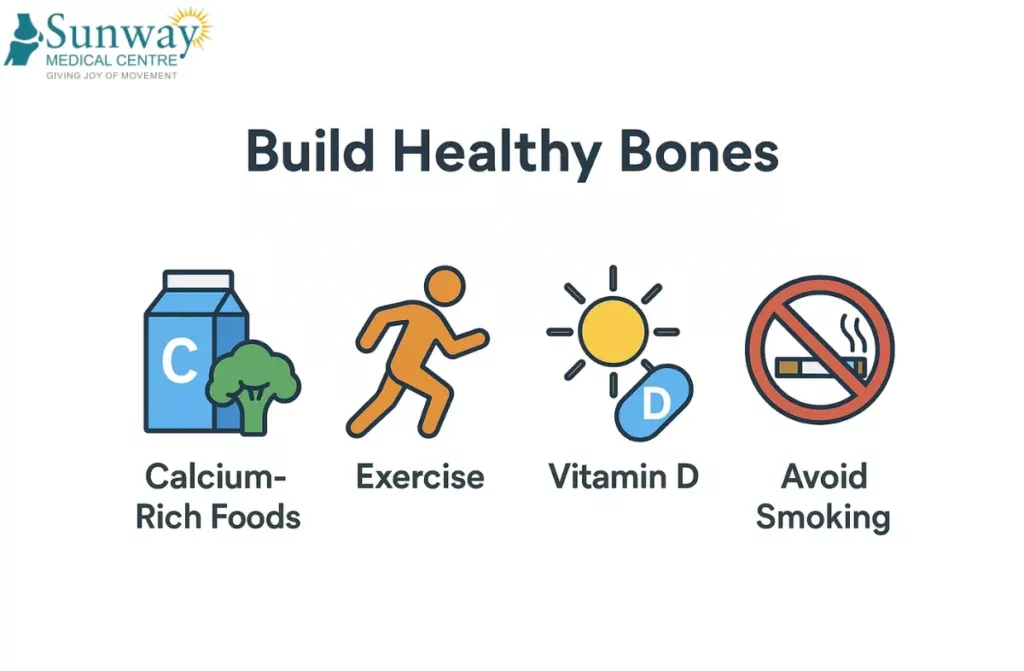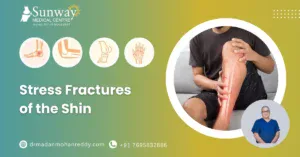Taking care of your bones is crucial for a healthy and active life. Also Learning how to improve bone health in women can help you avoid conditions like osteoporosis, fractures, and bone pain. Strong bones support your body’s structure, protect vital organs, and keep you mobile. This blog will share simple tips on improve bone health, including lifestyle changes, diet, and exercise. By following these strategies, you can enjoy strong, healthy bones for years to come.
Why is Bone Health Important?
Bone health is vital for overall well-being. Healthy bones provide structure to the body, protect organs, and enable movement. Without strong bones, we are more likely to experience fractures, pain, and conditions like osteoporosis. Learning improve bone health helps you avoid these problems. Learning why bone health is important and how to improve bone health in women is important as hormonal changes during menopause lead to faster bone loss. Proper care ensures your bones stay strong, preventing complications later in life.
What Affects Bone Health?
Several factors can affect your bone health. Age, gender, diet, and physical activity all play a role. How to improve bone health involves understanding these factors. As we age, bones naturally lose density, making them weaker and more prone to fractures. Hormonal changes, especially in women, can accelerate bone loss. A diet low in calcium and vitamin D, along with a lack of exercise, can also harm bone health. Protecting your bones requires taking these factors into account and making the right lifestyle choices.
How Can I Maintain Strong and Healthy Bones?
To maintain strong bones, it’s important to know how to improve bone health. Start by eating a diet rich in calcium and vitamin D. Engage in regular weight-bearing exercises, like walking, running, or lifting weights. These activities help stimulate bone growth and prevent bone loss. You should also avoid smoking and excessive alcohol, as these can weaken bones. By following these simple steps, you’ll support your bone health and reduce the risk of fractures and other bone-related problems.

Exercise for Your Bone Health
- Weight-Bearing Workouts to Build Healthy Bones: Engaging in weight-bearing exercises such as walking, jogging, and dancing stimulates bone-forming cells. These activities force the body to work against gravity, strengthening bones and improving overall skeletal density over time.
- Resistance Training Enhances Bone Strength: Strength training with dumbbells, resistance bands, or bodyweight exercises like squats and lunges helps in preserving and increasing bone mass. It also improves muscle strength, which supports joints and reduces the risk of falls or fractures treatment.
- Balance and Flexibility Exercises to Prevent Injury: Yoga and tai chi are effective for enhancing balance and flexibility, which are crucial for bone health as they reduce fall risks. Better coordination helps protect bones, especially in older adults prone to osteoporosis.
- Exercise Complements Indian Food for Strong Bones: When combined with calcium- and vitamin D-rich Indian foods like ragi, paneer, sesame seeds, and leafy greens, exercise accelerates bone regeneration. A consistent fitness routine and traditional nutrition work together to naturally improve bone health.
How does exercise improve bone health?
- Exercise plays a crucial role in strengthening bones and maintaining skeletal health throughout life. Weight-bearing activities such as walking, running, or dancing stimulate bone-forming cells, which increase bone density and make bones more resistant to fractures. Resistance training, like lifting weights, not only strengthens muscles but also places healthy stress on bones, promoting their growth and durability.
- Regular physical activity improves balance, coordination, and flexibility, reducing the risk of falls and injuries that can compromise bone strength. This is especially vital as one ages since bone mass naturally declines, leading to conditions like osteoporosis. Understanding why bone health is important helps highlight the role of consistent exercise in preventing long-term complications and ensuring mobility.
10 Natural Ways to Build Healthy Bones
Taking small, consistent steps each day can go a long way in protecting your bone strength and overall mobility. Whether you’re looking to prevent future issues or support aging bones, here are ten proven and natural lifestyle strategies that show exactly how to improve bone health at any stage of life:
1. Include Calcium-Rich Foods Every Day
Calcium is the foundational mineral for strong bones. Without enough of it, your body starts pulling calcium from your bones, weakening them over time. Prioritize foods like low-fat dairy, tofu, kale, almonds, and calcium-fortified alternatives such as soy or oat milk.
2. Enhance Vitamin D Through Safe Sunlight & Foods
Vitamin D is essential for supporting the body’s ability to absorb calcium effectively. Just 10–15 minutes of morning sunlight exposure a few times a week can help. Pair it with vitamin D-rich foods like eggs, mushrooms, and salmon, or talk to your doctor about supplements if you’re deficient.
3. Engage in Low-Impact Weight-Bearing Activities
Activities that force your body to work against gravity help maintain and even build bone density. Exercises like brisk walking, dancing, stair climbing, or hiking are simple yet powerful ways to keep bones resilient, especially in the hips and legs.
4. Add Resistance Workouts to Your Routine
Strength training isn’t just for athletes it’s essential for bone strength. Incorporating resistance bands, free weights, or bodyweight moves like squats and push-ups 2–3 times a week can trigger your bones to rebuild and stay dense.
5. Fuel with Bone-Supportive Proteins
Protein forms the building blocks of collagen a major component of bone structure. Include lean meats, lentils, beans, Greek yogurt, and nuts in your meals. A balanced protein intake supports how to improve bone health and aids in post-exercise recovery too.
6. Cut Back on Excess Salt and Processed Foods
A diet high in sodium can cause your body to lose calcium through urine. Reducing salty snacks, processed meats, and packaged meals can help preserve bone mineral content. Cooking fresh, whole foods is a powerful part of what supports bone health.
7. Hydrate Smartly and Limit Caffeine
Hydration matters more than you think. Drinking enough water helps nutrient absorption and joint lubrication. Meanwhile, too much caffeine and sugary drinks can interfere with calcium retention. Swap your third cup of coffee for green tea, herbal infusions, or bone broth.
8. Eat Foods That Support Bone Health
In addition to calcium and vitamin D, bones need magnesium, vitamin K2, omega-3s, and zinc. Load your plate with leafy greens, chia seeds, avocados, sardines (with bones), and fermented foods to nourish bones from within.
9. Practice Balance & Core-Strengthening Exercises
Falls are a major cause of fractures, especially in seniors. Improve your stability through balance-focused practices like yoga, tai chi, or simple one-leg stands. Strengthening your core muscles also protects your spine and posture.
10. Manage Stress & Sleep Well
Stress and poor sleep can disrupt the hormones that regulate bone remodeling. Try mindfulness practices like deep breathing, journaling, or nature walks, and aim for 7–9 hours of quality sleep to give your bones the recovery time they need.
Food for Healthy Bones
A healthy, balanced diet plays a critical role in supporting bone health. The right nutrients can help you build and maintain strong bones. Here are some foods that keeps bone healthy and known to improve bone health:
- Calcium-rich foods: Calcium is essential for bone strength and plays a major role in bone formation. Include dairy products like milk, yogurt, and cheese, as well as leafy green vegetables like kale, spinach, and broccoli.
- Vitamin D: Vitamin D helps the body absorb calcium efficiently. Include fortified foods like milk and cereals, as well as fatty fish like salmon and tuna.
- Magnesium: This mineral helps in calcium absorption and bone formation. Almonds, pumpkin seeds, and whole grains are rich sources.
- Protein: Protein is vital for bone health and helps the body build bone cells. Incorporate lean meats, beans, lentils, and tofu into your diet.
Incorporating these foods into your daily meals can contribute to stronger bones and improve your bone density over time. Remember, what supports bone health involves proper nutrition, and adopting a healthy diet is one of the key elements in how to improve bone health in women.
Other Ways to Protect Your Bones
Beyond nutrition and exercise, several other habits and preventive steps are equally important when thinking about what supports bone health long-term.
- Get Regular Bone Density Tests: Especially for women over 50, these scans help detect early signs of bone thinning and guide treatment if needed.
- Create a Fall-Safe Environment at Home: Use non-slip mats, clear walking paths, and ensure good lighting to prevent accidents particularly for seniors.
- Consider Supplements if Needed: If you’re not getting enough calcium or vitamin D through food, talk to your doctor about adding safe supplements.
- Try Mind-Body Activities: Yoga and Pilates improve coordination, joint flexibility, and stress levels all of which contribute to safer movement and better bone strength.
- Tailored Guidance for Women: Hormonal changes after menopause accelerate bone loss. Learning how to improve bone health in women through hormone-safe nutrition and strength exercises can make a big difference.
Conclusion
Caring for your bones is essential for maintaining an active and healthy lifestyle. Understanding how to strengthen your bones can help reduce the risk of bone loss, fractures, and conditions such as osteoporosis. By eating a balanced diet, staying active, and avoiding harmful habits, you can protect your bones throughout life. Learn why bone health is important and make it priority today, and you’ll enjoy stronger bones tomorrow. Incorporating the tips above will help ensure your bones remain healthy and strong for years to come.




